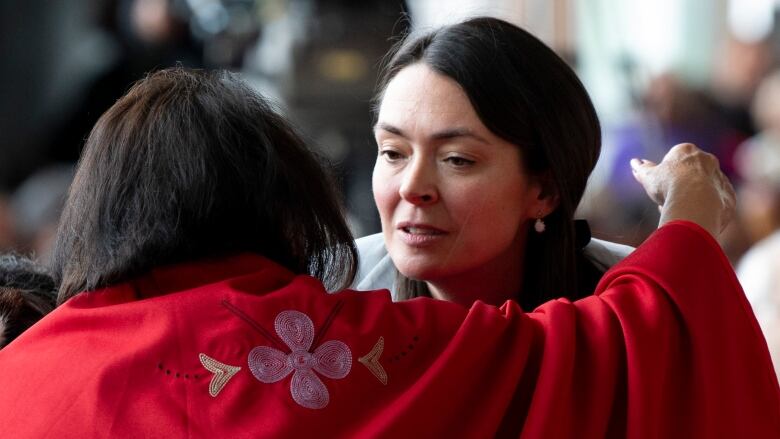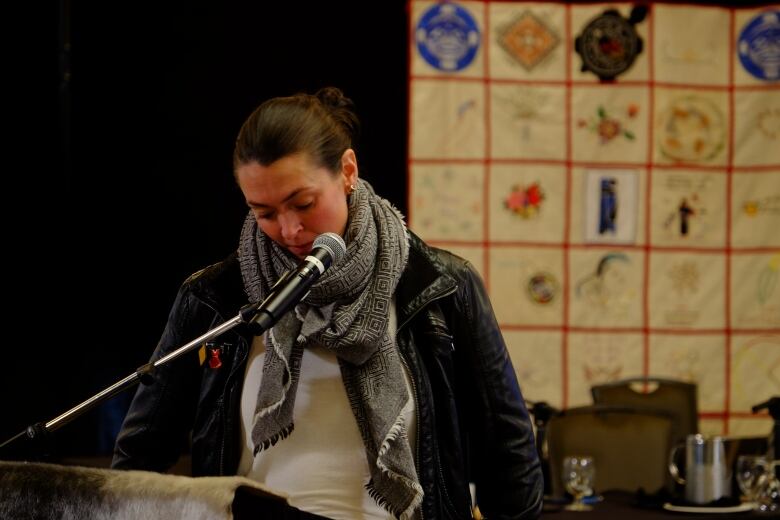Breaking down what the MMIWG inquiry heard from northerners
Commissioner Qajaq Robinson, who grew up in Nunavut, expands on inquiry's final report

The final report of the National Inquiry into Missing and Murdered Indigenous Women and Girls has generated discussion across Canada since it was released on June 3.
To better understand the report, and its 231 calls for justice, CBC North's The Trailbreaker host Loren McGinnis spoke with Qajaq Robinson, one of the inquiry's commissioners.
Robinson grew up in Igloolik, Nunavut, and is a former Crown prosecutor in that territory. She spoke about what the inquiry heard from northerners as it prepared its final report and calls for justice.
Here are some excerpts from thatconversation, as well as audio from their full interview in four parts.
Culture and language
Robinson said in its travels through Nunavut, the Northwest Territories and Yukon, as well as northern regions of the provinces, the inquiry heard a number of people talk about the importance of culture and language, and the devastating impacts of losing them.
"Every generation speaks their language less and lessand that's something that we heard from, particularly the elders, as being a really serious concern. Like, they're watching their culture and language disappear in front of their eyes and there's an urgent need to adjust that and to protect and revitalize culture and language," she said.
"We have to recognize that culture and language does speak to safety because it really does help understand and define how a community works together, cares for each other," she said.
"You look at the way, you know, in some cultures language defines relationships, like through naming or kinship ties you can have a relationship and therefore obligations to, you know, care for and protect almost everybody in your community because you have a relationship and an obligation because of the way your culture and your language defines it. And that's the really important area to protect and to revitalize and reclaim."

Essential services and staff turnover
"There's so few health and wellness services, particularly within smaller communities, and there's this pattern that was described to us of a highly transient workforce," Robinson said.
"So you've got a lot of nurses, mental health workers, even teachers that come and stay within a community for a period of time and then they leave, so there isn't that continuity of care. And then there isn't enough of an investment in the capacity of a community to provide those services themselves, so those services can often lack cultural safety or competency or even relevancy.
"Then because of the high rates of turnover and staff, they don't have the continuity of care. You know, [we] heard some witnesses talk about how they had to talk about what happened numerous times, re-telling their stories when they were ready to move on to the next step, but every time they met with a new mental health worker they had to start back at the beginning."
Policing
Robinson said the inquiry also heard northerners' concerns about short-term or limited-duration posts for RCMP officers stationed in many communities.
"There's undeniably a history of distrust between Indigenous communities and police, and particularly the RCMP, and I think we have to be blunt about that and real about that that the RCMP in many communities was used as a tool to enforce state laws designed to disrupt the community, so, to take children away from the community and take them to residential school. They were the enforcers of the child welfare system," she said.
Robinson said commissioners heard from many people who said it's important to rebuild that relationship, and that work has to start with officers in the communities.
"Relationships are between a community and the officers there on the ground [and] the commanding officers," she said.
"The isolated post and limited post time frames that are currently the practice were identified as being barriers to really building relationships of trust in the community, having a real effective working relationship with the police there in the community and each detachment. So one of our calls for justice is to end that practice."

Robinson acknowledged that addressing issues around policing in Indigenous communities are very complex, and go beyond calling for an end to limited-duration posts for officers.
"It speaks to, you know, ensuring that policing services are in partnership with a community, that the priorities of a community help informthe budgets andthe activity of a police force," she said.
Robinson said they're calling for the inclusion of Indigenous communities in police boards, for example in hiring committies. Sheadded that much needs to be done to also educate police forces about the historical, cultural and regional realities that effective policing requires.
Resource extraction camps
Those who testified at the inquiry, including some in the North, talked about the impacts of resource extraction projects on the safety of Indigenous women, girls and LGBTQ and two-spirit people.
The inquiry's final report says that industries create "boomtown" and "man-camp" environments implicated in increased rates of drug and alcohol-related offences, sexual offences, domestic violence and gang violence, as well as sex-industry activities.
"We heard testimony in Iqaluit as well as in a number of communities, in our expert panels especially, about the dynamics around the extraction industry and development," Robinson said.
"These workplaces aren't often focused on attracting female employees. They're not often seen to be safe. And there's a tremendous amount of evidence about that."
"I think what we really have to look at, though, when we look at the calls for justice in this area isit's not sort of [an] anti-development approach, but really ensuring that when we look at approving these types of projects that there is an analysis that we look at how these projects will impact a community in a gendered way, understand how it's going to affect and benefit different members of the community, and try to ensure that these projects are happening in a way that they can actually lead to the economic advancement of all members of the community."
She added, "I think we also have to recognize that when you have a huge influx of any population within a community, it's going to put a strain on the existing social services, right? Health care, social work, education, policing. So that has to be part of what's considered before these projects are approved."
Based on an interview by Loren McGinnis, with files from The Canadian Press












_(720p).jpg)


 OFFICIAL HD MUSIC VIDEO.jpg)
.jpg)



























































































